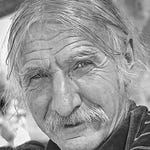70 - “Be here now”
Q: Robert, if our attention is on the senses, we are in the moment. If our attention is on thoughts, we are not in the moment. In human evolution, the brain expanded dramatically. With this new brain, we started having more thoughts, and more advanced thoughts. Our attention was drawn to those thoughts. So we evolved to be more not in the moment. If we want to be more in the moment, we just need to retrain ourselves to put our attention more on the senses.
A: I cannot agree. “Be here now” is an injunction against being lost in thought—not any kind of ultimate “truth”. One may be lost in thought to be sure, but one may also be lost in sensing. I see no superiority to either of those two conditions. Lost is lost. The best case is when you are lost in neither, but simply open and present to whatever may arise, be it a thought, a perception, an emotion, whatever. That is when one is most alive, I say.
My friend Joan Tollifson has said that if we give “open attention to sensations rather than ideas, impermanence is quite obvious, not as an idea we logically understand, but as our direct experience.” As I understood her, Joan was not recommending that one ought to prefer noticing sensations to noticing thoughts. She meant only that, for many of us, it may be easier to notice the fleetingness of sensations than it is to notice the transitory nature of thoughts, many of which, being habitual, seem “stickier” than sensations. This is particularly true of certain kinds of thoughts such as self-judgments, anxieties, and fears, etcetera.
However, one might equally well sit quietly and observe the flow of thought—how a thought rises, unbidden, only to be replaced by the next thought, and the next, and the next… That flow is no different from the flow of sensations. They are, in fact, parts of the same flow, the stream of consciousness.
Sensations, perceptions, feelings, thoughts, emotions—all of it—are occurring constantly, whether noticed or not, and cannot be divided.
The idea here is to open one’s eyes to the impermanence of all experience—including the experience of being “me.”








Share this post